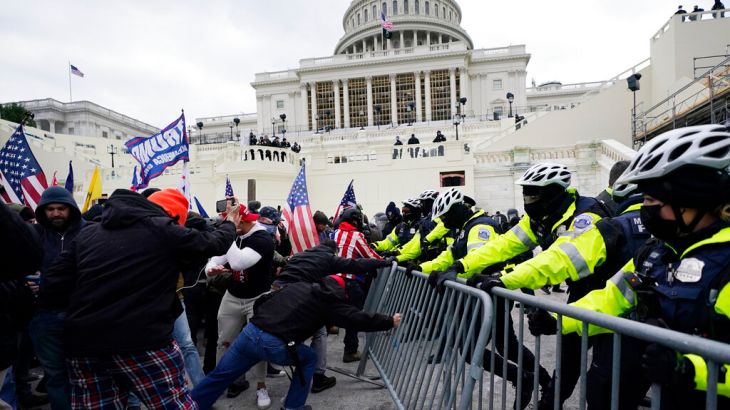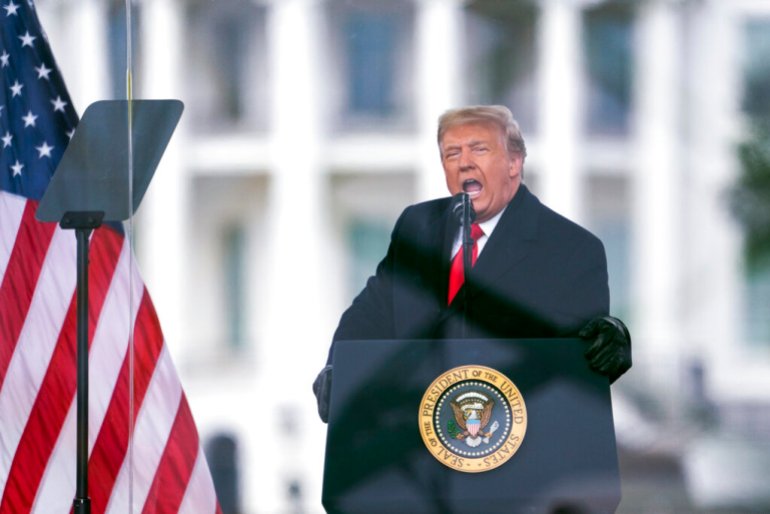5 key takeaways from January 6 panel’s report on US Capitol riot
Donald Trump led ‘multi-part conspiracy’ to overturn 2020 elections that ended in deadly riot, US congressional panel finds.

Washington, DC – “One man” is ultimately responsible for last year’s attack on the United States Capitol: Former President Donald Trump.
That is the conclusion of a nearly 850-page, final report released late on Thursday by a US congressional committee at the end of its 18-month investigation into the deadly riot on January 6, 2021.
Keep reading
list of 3 itemsJanuary 6 panel unveils report, describes Trump ‘conspiracy’
Key Trump allies refused to answer January 6 panel questions
The report came just days after the panel recommended criminal charges against Trump for his role in the attack, whi0ch saw a mob of the former president’s supporters storm the Capitol to prevent Congress from certifying Joe Biden’s election victory.
It builds on months of public hearings, during which US lawmakers made the case that Trump – who has rejected the committee’s work as partisan – whipped the crowd into a frenzy and then failed to act to stop the riot.
Here is a look at five key takeaways from the final report:
Trump is ‘central cause’ of the riot
The report unambiguously blamed Trump for the attack on the Capitol: “The central cause of January 6th was one man, former President Donald Trump, whom many others followed. None of the events of January 6 would have happened without him,” it said.
The panel went on to describe in detail what it dubbed Trump’s “multi-part conspiracy to overturn the lawful results of the 2020 presidential election”, arguing that this plot culminated in the riot.
Trump prematurely declared victory and started spreading voter fraud allegations; he pressured state election officials, the Department of Justice and his own Vice President Mike Pence to help reverse the results, and then he “summoned” supporters to Washington, DC, incited them to attack the Capitol, and failed to stop the riot for hours, the report read.
“President Trump’s decision to declare victory falsely on election night and, unlawfully, to call for the vote counting to stop, was not a spontaneous decision. It was premeditated,” it said.
Trump campaign tried to contact 190 state legislators
Members of the former president’s 2020 re-election campaign embarked on a concerted lobbying effort late that year to convince Republican legislators in critical swing states won by Biden to appoint electors for Trump despite his loss, the report also said.
“According to a campaign staffer’s spreadsheet produced to the Select Committee, the Trump Campaign apparently tried contacting over 190 Republican State legislators in Arizona, Georgia and Michigan, alone,” it read.
For example, in a voicemail to a Michigan legislator that was leaked to the press, a Trump campaign staffer urged a resolution in the state legislature to “allow Michigan to send electors for Donald J Trump to the Electoral College and save our country”.
“While Campaign aides blanketed State officials with these calls, some State officials received more personalized outreach directly from President Trump, [Trump’s lawyer Rudy] Giuliani, and their allies throughout the post-election period about this issue,” the report said.
Trump’s plan to join supporters at Capitol was serious
In his pre-riot speech at the Ellipse, near the White House, on January 6, 2021, Trump told his supporters that he would walk down to the Capitol with them. “After this, we’re going to walk down and I’ll be there with you … We’re going walk down to the Capitol,” he said, urging the crowd to “show strength”.
The committee said in its report that Trump was serious about those plans, as the US Secret Service tasked with protecting the president was ready to secure the trip until violence escalated on Capitol Hill.
The president “just said that he is going up to the US Capitol to ‘watch’ the vote”, one Secret Service official wrote in an email during the speech. As the protesters, some of whom would soon turn into rioters, walked towards Congress, Trump “was pressing his request to go to the Capitol“, the report said.
Robert Engel, the head of Trump’s Secret Service detail, is cited as saying that the then-president asked to go to the Capitol immediately after his speech, but his request was denied, and he returned to the White House. “President Trump, nevertheless, persisted in his request to go to the Capitol,” the report read.
Engel later wrote in an email that the Secret Service was “discussing options and setting expectations” around Trump’s request, but the force’s leadership eventually determined that it would not be advisable for Trump to go “anywhere near” the Capitol.

Law enforcement aware of potential violence
The report detailed how multiple security agencies, including DC Metropolitan Police, US Secret Service, Capitol Police (USCP), FBI, Department of Homeland Security (DHS), and the Department of Defense were aware of the potential for violence on January 6.
The agencies received intelligence about online posts on various social media platforms and pro-Trump websites calling for an attack on the Capitol days before the riot, the committee’s report said. For instance, a January 2, 2021, post by a Trump supporter read, “This is not a rally and it’s no longer a protest. This is a final stand … many are ready to die to take back #USA … And don’t be surprised if we take the #capital building [sic].”
A Capitol Police intelligence official also told the force’s leadership that January 6 would be the final chance for Trump’s supporters to overturn the 2020 election, which increases the potential for violence, noting that the “target is Congress“.
Yet despite the intelligence and publicly available threats against the US legislature, the report showed that law enforcement officials across various agencies still underestimated the potential for violence, arguing that Capitol Police would be able to contain the situation.
For example, top Capitol Police officials discussed calling in the National Guard before January 6 but “later agreed that a request for the DC National Guard would not be necessary, particularly if the USCP was in an ‘all hands on deck’ posture”, the report said.
Lawmakers concluded in their report that there “are additional steps that should have been taken to address the potential for violence on that day”.
Panel issues recommendations
The report included a list of recommendations by committee members to prevent events similar to January 6 from happening again, including prosecuting individuals responsible for the attack and reprimanding lawyers who pushed false election fraud claims.
Committee members also said those responsible for the events of January 6 should be disqualified from holding public office in accordance with the 14th Amendment of the US Constitution, which addresses “insurrection” – a reference to Trump, who is running for president in 2024.
The report urged “whole-of-government strategies to combat the threat of violent activity posed by all extremist groups, including white nationalist groups and violent anti-government groups” while adding that law enforcement agencies need to improve their response to such threats.
The House of Representatives’s subpoena authorities should also be strengthened after several Trump allies and the former president himself defied the committee’s requests for information and testimony, it said.
Thanks to the dedicated folks at @USGPO, the final report is on its way.
Read it now: https://t.co/IaOMOevYfr pic.twitter.com/fmho4WvyQJ
— January 6th Committee (@January6thCmte) December 23, 2022